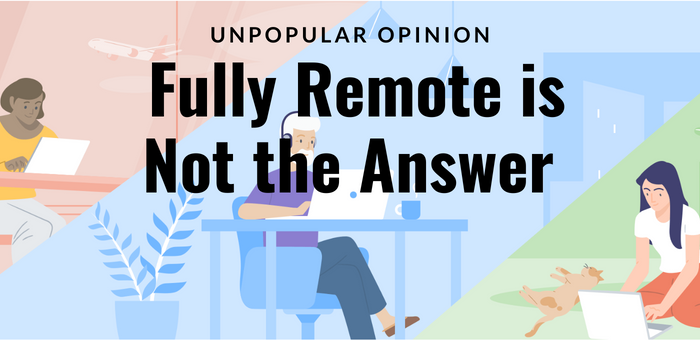
Unpopular Opinion: Fully Remote is Not the Answer
- October 2, 2022
- Savannah Higgins
- Uncategorized
- No Comments
I challenge you to think of all the things that make you a great professional. Is it simply your technical skillset and production? Doubtful! Perhaps you are…
- The voice of the team who advocates for departmental concerns and challenges
- The supporter who is a sounding board for professional/personal issues
- The friendly face who offers day-making smiles to passersby
- The ”class clown” who brings levity in stressful times
- The resident Excel guru who can quickly create efficiencies with a couple keystrokes
- The social coordinator who organizes potlucks and brings holiday cheer
How are you going to share all the gifts you have to offer via emails, video chats, and phone calls?
In a corporate world where remote work is in high demand, and even a “must have” for many candidates considering a move, I encourage professionals to pause for a moment and consider some of the advantages of spending time in the office. The virtual environment has afforded professionals flexibility and a great way to balance professional and personal lives; I get it! But how do you truly create a culture and a brand with such physical divide. Interactions quickly become all about work, and there is minimal opportunity for deeper relationship building.
As the time for promotions comes around, how will the best leaders be identified? The smartest person in the room does not always embody the characteristics that make a strong leader. Without the casual interactions that organically occur in an office environment requiring general people skills and social and emotional intelligence, how will executives assess these soft skills? How will employees demonstrate them?
Historically, it has been those in a management capacity that have had a choice on how much to tangibly engage. I have always admired those in leadership who understand the value of face time with their teams, even if that means flying to various locations periodically. This art has been dwindling over recent decades as managers take on supervision of larger territories and leverage technology to oversee operations. In this post-COVID environment, we are now seeing this choice lying with professionals across levels and functions. Most of which are leaning heavily toward staying in the comfort of their homes. Just as I think top-notch leaders recognize the criticality of the in-person approach to management (when feasible), I argue that employees looking to embrace their company culture and advance their careers should choose to be heard and seen.
